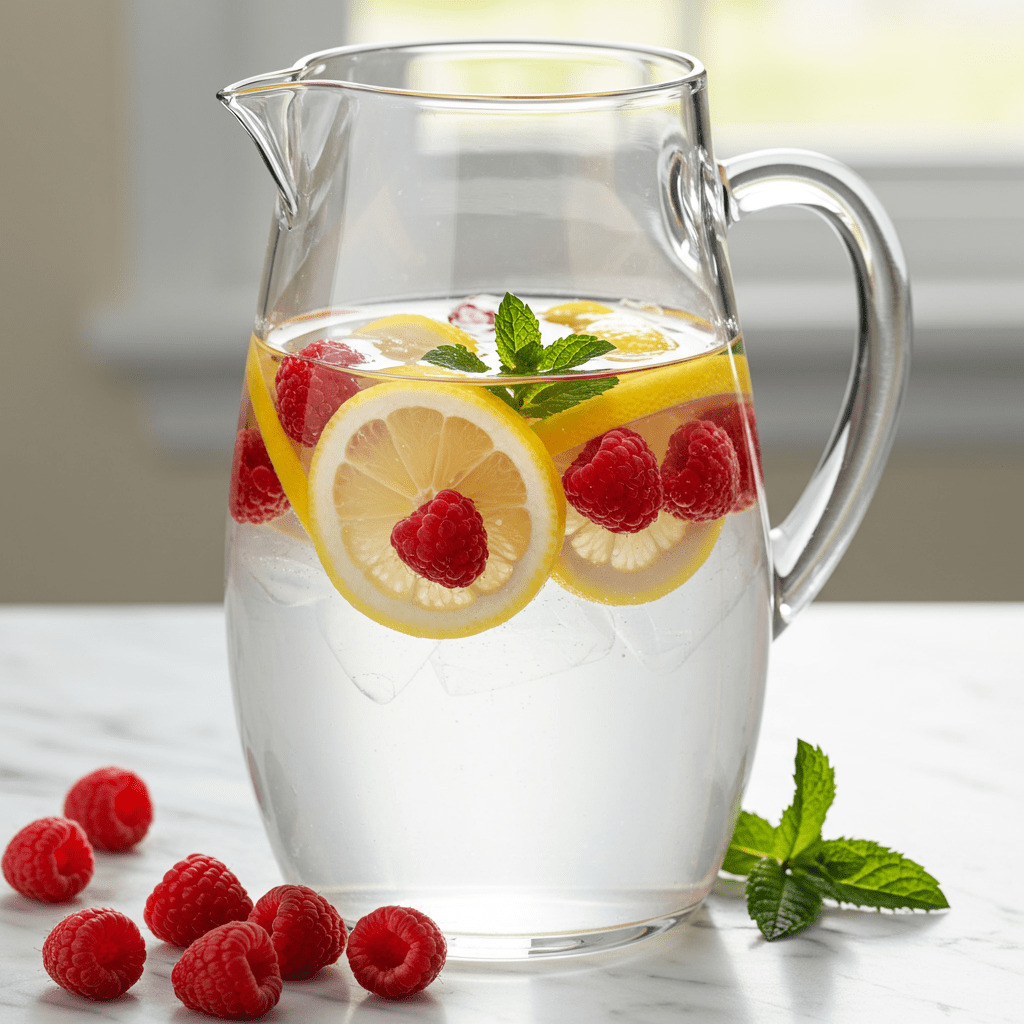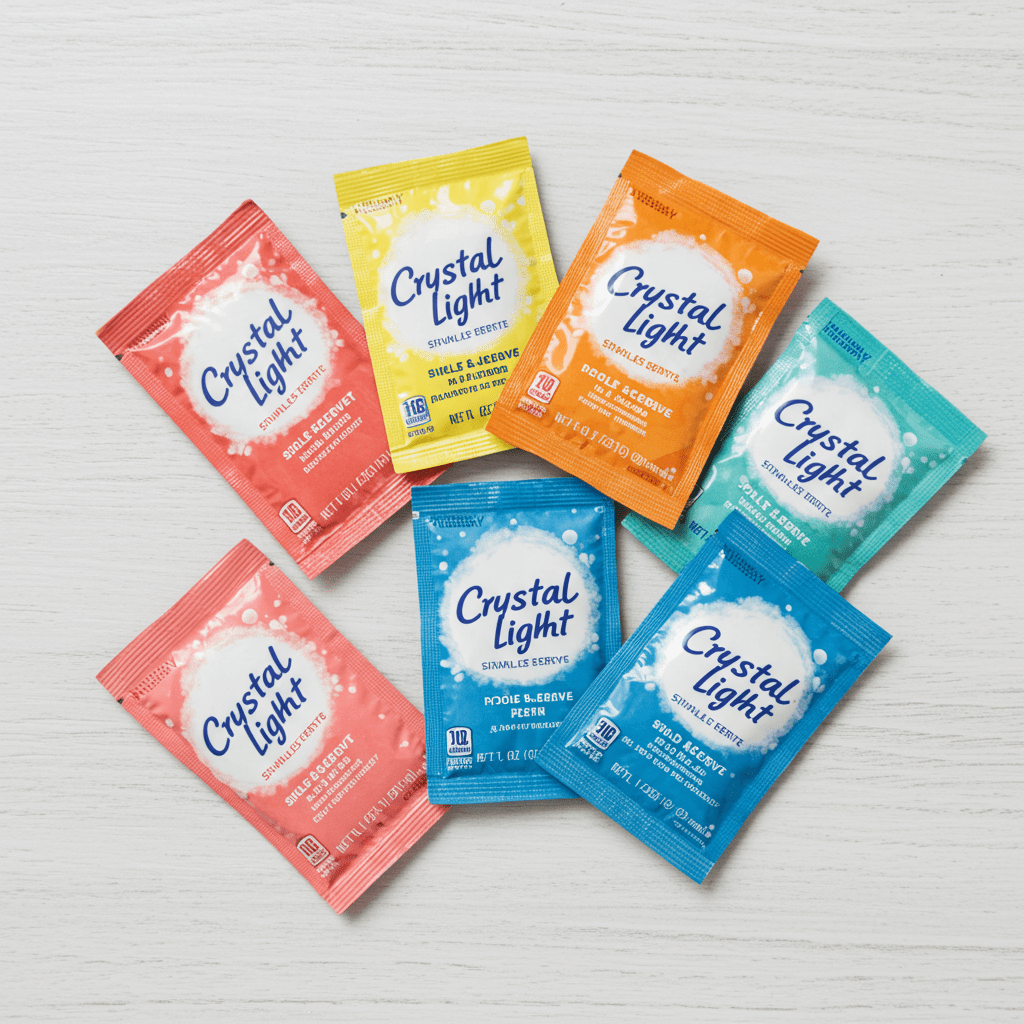Is Crystal Light Actually Bad for You? A Dietitian’s Honest Take

We all know we should drink more water, but let’s be honest—plain water can be boring. In the quest to stay hydrated, you’ve probably come across Crystal Light.
These convenient little packets promise a burst of flavor with zero sugar and minimal calories, which sounds like the perfect solution. But with so much debate around artificial ingredients, you might be wondering, ‘Is Crystal Light actually bad for me?’ As a registered dietitian, I help people navigate these exact questions every day.
The world of nutrition is full of conflicting information, especially when it comes to artificial sweeteners. My goal is to provide a clear, balanced, and evidence-based perspective.
We’ll look beyond the hype, examine the ingredients inside that packet, and review what the current scientific research says, so you can feel confident in your choice.
What Exactly Is in a Packet of Crystal Light?

To understand if Crystal Light is a good fit for you, we first need to look at what’s inside. While recipes vary slightly by flavor, most classic Crystal Light products share a core set of ingredients.
- Citric Acid: This is typically the first ingredient listed. It provides the tart, tangy flavor and also acts as a preservative.
- Potassium Citrate and Sodium Citrate: These ingredients help regulate the acidity of the product.
- Aspartame & Acesulfame Potassium (Ace-K): These are the two main non-nutritive (zero-calorie) sweeteners used to give Crystal Light its sweetness without sugar. Aspartame is about 200 times sweeter than sugar, while Ace-K is also around 200 times sweeter and is often blended with other sweeteners to create a more sugar-like taste.
- Maltodextrin: This is a powder derived from corn, rice, or potato starch. It’s often used as a thickener or filler and to carry the flavor. While it is a carbohydrate, it’s used in such small amounts in Crystal Light that it contributes negligible calories or sugar.
- Artificial Colors: This is what gives the drink its vibrant hue. Common dyes include Red 40, Yellow 5, and Blue 1, depending on the flavor.
- Natural and Artificial Flavors: These provide the specific fruit or tea taste.
It’s important to note that the ‘Crystal Light Pure’ line uses different ingredients, swapping aspartame for sugar and stevia or monk fruit and using natural colors from sources like turmeric and vegetable juice.
Are the Artificial Sweeteners in Crystal Light Safe?

This is the million-dollar question and the source of most of the controversy. The main sweetener, aspartame, has been the subject of public debate for years.
However, it’s also one of the most thoroughly studied food additives in the world. Major regulatory bodies, including the U.S. Food and Drug Administration (FDA), have repeatedly reviewed the scientific evidence and concluded that aspartame is safe for the general population. The FDA has set an acceptable daily intake (ADI) for aspartame at 50 milligrams per kilogram of body weight per day.
To put that in perspective, a 150-pound person would need to consume about 19 cans of diet soda or over 80 single-serve packets of Crystal Light every single day to exceed this limit. In 2023, the International Agency for Research on Cancer (IARC), a branch of the World Health Organization (WHO), classified aspartame as ‘possibly carcinogenic to humans.’ This caused a stir, but it’s crucial to understand what this classification means.
The IARC assesses potential hazards but doesn’t consider real-world consumption levels. Another WHO expert committee that does assess risk, JECFA, simultaneously reviewed the evidence and reaffirmed the existing ADI, stating that they did not see convincing evidence of harm from consumption within this limit.
My takeaway as a dietitian is that based on the current body of evidence, consuming aspartame in moderation is not a significant concern for most people.
Could Crystal Light Affect Your Gut Health?

The conversation around gut health has exploded in recent years, and for good reason. A healthy gut microbiome influences everything from digestion to immune function.
So, how do non-nutritive sweeteners fit in? Research in this area is still emerging, but some studies suggest certain artificial sweeteners may alter the balance of bacteria in the gut.
A 2019 review published in Advances in Nutrition noted that some animal and human studies have shown that sweeteners like sucralose and saccharin can change the composition and diversity of the gut microbiota. A 2022 study published in the journal Cell also found that sweeteners, including aspartame and sucralose, could alter the gut microbiome in humans.
However, the results are often inconsistent, and the real-world health implications of these changes are not yet fully understood. It’s unclear if the minor changes observed have any meaningful negative effects on long-term health.
If you have a sensitive digestive system or a condition like Irritable Bowel Syndrome (IBS), you might find that artificial sweeteners don’t agree with you. This is highly individual, and my advice is to pay attention to how your own body responds.
The Real Benefits of Drinking Crystal Light

Despite the concerns, Crystal Light can be a genuinely useful tool in certain situations. It’s not about whether it’s a ‘health food,’ but whether it’s a better choice than other options.
- A Powerful Hydration Aid: For people who genuinely dislike the taste of plain water, a flavored drink mix can be a game-changer. If a packet of Crystal Light helps you meet your daily fluid needs and prevents chronic dehydration, that is a significant health benefit.
- Excellent for Blood Sugar Management: Since it’s sugar-free, Crystal Light does not raise blood glucose levels. This makes it a safe and satisfying option for individuals with type 2 diabetes or insulin resistance who need to avoid sugary beverages.
- A Tool to Wean Off Sugary Drinks: Are you trying to kick a daily soda or sweet tea habit? Replacing a 150-calorie, 40-gram sugar drink with a 5-calorie, 0-gram sugar Crystal Light is a clear step in a healthier direction. It can serve as a transitional tool to help reduce overall sugar intake, which is one of the most impactful dietary changes you can make.
Who Should Probably Skip It?
While it’s safe for most, there are a few groups of people who should avoid Crystal Light and other products containing aspartame.
- Individuals with Phenylketonuria (PKU): This is a rare genetic disorder where the body can’t break down an amino acid called phenylalanine, which is a component of aspartame. People with PKU must follow a strict diet low in phenylalanine, and all products containing aspartame carry a warning label for this reason.
- People with Known Sensitivities: A small percentage of people report experiencing headaches, digestive upset, or other symptoms after consuming artificial sweeteners. While this isn’t a true allergy, if you consistently feel unwell after drinking Crystal Light, it’s best to listen to your body and choose an alternative.
- Those Who Prefer a ‘Clean’ Diet: If your personal food philosophy is to avoid artificial colors, flavors, and sweeteners, then Crystal Light simply isn’t the right product for you, and that’s perfectly fine. There are many other ways to flavor your water naturally.
Delicious and Healthy Ways to Flavor Your Water Naturally
If you’ve decided Crystal Light isn’t for you, or you just want to mix things up, making your own flavored water is easy, healthy, and delicious. It’s a fantastic way to get natural vitamins and phytonutrients without any artificial ingredients. Pairing these drinks with a vibrant, go-to healthy lunch like a broccoli salad can make for a perfect wellness-focused meal.
Here are some of my favorite combinations:
- Citrus & Mint: Combine slices of lemon, lime, and orange with a few sprigs of fresh mint. It’s incredibly refreshing.
- Berry Blast: Lightly muddle a handful of fresh or frozen raspberries, blueberries, and strawberries in the bottom of your pitcher before adding water.
- Cucumber & Basil: This spa-inspired combo is cooling and sophisticated. Thinly sliced cucumber and fresh basil leaves make for a uniquely savory and hydrating drink.
- Ginger & Peach: Add a few thin slices of fresh ginger and some ripe peach slices. It’s a perfect balance of spicy and sweet.
- Herbal Tea Infusion: Brew a strong cup of your favorite herbal tea (like hibiscus, peppermint, or chamomile), let it cool, and then add it to your pitcher of cold water. It adds a wonderful depth of flavor.
Conclusion
So, is Crystal Light bad for you? From my perspective as a registered dietitian, the answer is no—it is not inherently ‘bad’ for the vast majority of people when consumed in moderation.
The ingredients it contains have been deemed safe by major health authorities, and it can be a valuable tool for increasing hydration and reducing your intake of high-sugar drinks. However, it’s also not a ‘health food.’ It’s a highly processed product with artificial ingredients.
The gold standard for hydration will always be plain water. Natural infusions with fruits and herbs are a fantastic second choice.
Think of Crystal Light as a ‘better than’ option—better than soda, better than juice, and better than being dehydrated. It’s about context and your personal health goals.
If it helps you drink more water and you enjoy it without any side effects, there’s no need to feel guilty about it. If you prefer to stick to natural ingredients, there are wonderful alternatives. The best choice is the one that you feel good about and that supports your overall healthy lifestyle.

[…] These additives are approved by the FDA and are considered safe for consumption in the amounts used. However, some people prefer to avoid them for personal health reasons or because they seek out minimally processed foods. […]
[…] Sodium phosphates serve a functional purpose in keeping poultry juicy. The primary concern with these is less about their inherent danger and more about the fact that they are markers of a more processed product. For people focused on whole foods, this is a valid consideration for many grocery store items, from convenient dinners to popular drink mixes. […]
[…] As a dietitian, I give CAVA a slight edge due to its vegetable-forward approach and focus on heart-healthy fats, but a mindful order at either restaurant can be a solid choice. Making an informed decision here is similar to evaluating other popular food items, like questioning if diet drinks are truly a healthy choice. […]